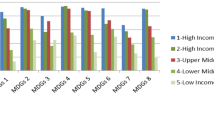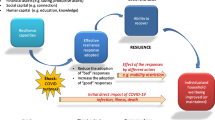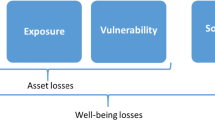Abstract
Unlike previous studies which focused on the economic effects of infrastructures, this paper contributes to the literature by analysing the contribution of infrastructure development to well-being, considered the aim of all efforts. The paper uses composite infrastructure indexes from the African Development Bank, to capture infrastructure quality and the life ladder index as proxy for subjective well-being on a sample of 29 African countries during the 2007–2018 period. Estimates are done using panel corrected standard errors, Tobit regression, and the generalised method of moments. Results show that infrastructure development boosts the well-being of Africans. Further analysis at the disaggregated level shows that information and communication technology (ICT) and electricity are the main drivers of happiness in the region. After testing for possible mediators, human capital is found to be the main channel through which infrastructure development enhance subjective well-being in Africa. Therefore, policies aiming to promote the well-being of Africans should consider investments in infrastructure development, especially ICT, electricity, transport, water supply, and sanitation services. This would in turn improve the performance of institutions and human capital, contributing to the well-being of Africans.

Source: WHR (2023)

Source: IRF World Road Statistics (2019)

Source: ITU based on ICT indicators database

Source: Author’s construction

Source: Author’s construction

Source: Author’s own elaborations
Similar content being viewed by others
Data Availability
The data underlying this article will be shared on request.
Notes
Nevertheless, amidst the observed hurdles, there are still notable improvements in infrastructure development in the region. For example, according to the Africa infrastructure development index (AIDI), all scores pertaining to electricity, transport, ICT, water, and sanitation improved for virtually all countries in Africa between 2016 and 2018 (AfDB, 2018b). Also, relative to other infrastructures, telecommunication infrastructure has not only experienced progress across all income groups in Africa but also doubled total access rates albeit still low relative to South Asia with 55%, Latin America, and the Caribbean and East Asia (above 80%).
The 20 saddest countries are Afghanistan, Lebanon, Sierra Leone, Zimbabwe, Congo, Botswana, Malawi, Comoros, Tanzania, Zambia, Madagascar, India, Liberia, Ethiopia, Jordan, Togo, Egypt, Mali, Gambia, and Bangladesh.
Benin; Botswana; Burkina Faso; Cameroon; Chad; Congo, Dem. Rep.; Congo, Rep.; Egypt, Arab Rep.; Gabon; Ghana; Guinea; Kenya; Liberia; Madagascar; Malawi; Mali; Mauritania; Morocco; Niger; Nigeria; Rwanda; Senegal; Sierra Leone; South Africa; Tanzania; Tunisia; Uganda; Zambia; Zimbabwe.
Variance inflation factors (VIFs) are used to assess multicollinearity. VIF illustrates how multicollinearity causes an estimator’s variance to increase. The collinearity of a variable increases with increasing VIF value. If the average VIF across all variables is higher than 6 and the biggest individual VIF is more than 10 (Enders, 2004), there is evidence of the multicollinearity issue. It appears that the observed VIF values for the model’s variables are accurate. The outcomes show that multicollinearity is not a concern for our variables.
Let us recall that subjective well-being (happiness) as measured by the life ladder index takes values between 0 and 10. See Helliwell et al. (2019) for details on the construction of this index.
Governance is a composite index constructed from principal component analysis (PCA) using the six governance indicators from the Worldwide Governance Indicators database, while secondary school enrolment (% gross) is used as proxy for human capital.
References
AfDB. (2018a). African economic outlook, African Development Bank Group, Ivory Coast, Abidjan.
AfDB. (2018b). Retrieved, March 18, 2023, from https://dataportal.opendataforafrica.org/AIDI
Ahmad, S., Mathai, M. V., & Parayil, G. (2014). Household electricity access, availability and human well-being: Evidence from India. Energy Policy, 69, 308–315.
Ali, M. S. B. (2020). Does ICT promote democracy similarily in developed and developing countries? A linear and nonlinear panel threshold framework. Telematics and Informatics, 50, 101382.
Arellano, M., & Bond, S. (1991). Some tests of specification for panel data: Monte Carlo evidence and an application to employment equations. Review of Economics Studies, 58(2), 277–297.
Arellano, M., & Bover, O. (1995). Another look at the instrumental variable estimation of error-components models. Journal of econometrics, 68(1), 29–51.
Aschauer, D. A. (1989). Is public expenditure productive? Journal of Monetary Economics, 23(2), 177–200.
Asongu, S. A., & Le Roux, S. (2017). Enhancing ICT for inclusive human development in Sub-Saharan Africa. Technological Forecasting and Social Change, 118, 44–54.
Augsburg, B., & Rodriguez-Lesmes, P. A. (2018). Sanitation and child health in India. World Development, 107, 22–39.
Azolibe, C. B., & Okonkwo, J. J. (2020). Infrastructure development and industrial sector productivity in Sub-Saharan Africa. Journal of Economics and Development, 22(1), 91–109.
Balkin, J. M. (2017). Digital speech and democratic culture: A theory of freedom of expression for the information society In Paul Schiff Berman (Eds) Law and Society Approaches to Cyberspace. Routledge, pp. 325–382.
Barron, M., & Torero, M. (2017). Household electrification and indoor air pollution. Journal of Environmental Economics and Management, 86, 81–92.
Baum, C. F., Schaffer, M. E., & Stillman, S. (2003). Instrumental variables and GMM: Estimation and testing. Symposium (international) on Combustion, 3(1), 1–31.
Beck, N., & Katz, J. N. (1995). What to do (and not to do) with time-series cross-section data. American Political Science Review, 89(3), 634–647.
Belasen, A. R., & Hafer, R. W. (2013). Do changes in economic freedom affect well-being. Journal of Regional Analysis & Policy, 43(1), 56–64.
Bhattacherjee, A., & Shrivastava, U. (2018). The effects of ICT use and ICT Laws on corruption: A general deterrence theory perspective. Government Information Quarterly, 35(4), 703–712.
Blundell, R., & Bond, S. (1998). Initial conditions and moment restrictions in dynamic panel data models. Journal of Econometrics, 87(1), 115–143.
Bond, J. (2016). Infrastructure in Africa. Global Journal of Emerging Market Economies, 8(3), 309–333.
Buccafusco, C., & Masur, J. S. (2020). Drugs, patents, and well-being. Washington University Law Review, 98, 1403.
Calderón, C., & Chong, A. (2004). Volume and quality of infrastructure and the distribution of income: An empirical investigation. Review of Income and Wealth, 50(1), 87–106. https://doi.org/10.1111/j.0034-6586.2004.00113.x
Calderón, C., & Servén, L. (2010). Infrastructure and economic development in Sub-Saharan Africa. Journal of African Economies, 19(suppl_1), i13-i87. https://doi.org/10.1093/jae/ejp022
Cameron, L., Chase, C., & Suarez, D. C. (2021). Relationship between water and sanitation and maternal health: Evidence from Indonesia. World Development, 147, 105637.
Castriota, S. (2006). Education and happiness: A further explanation to the Easterlin Paradox. Unpublished paper.
Chakamera, C., & Alagidede, P. (2018). The nexus between infrastructure (quantity and quality) and economic growth in Sub Saharan Africa. International Review of Applied Economics, 32(5), 641–672. https://doi.org/10.1080/02692171.2017.1355356
Charlier, D., & Legendre, B. (2022). Fuel poverty and health: A shared agenda for policy. Revue d’économie politique, 32(2), 245-272.
Danna, K., & Griffin, R. W. (1999). Health and well-being in the workplace: A review and synthesis of the literature. Journal of Management, 25(3), 357–384.
Di Tella, R., MacCulloch, R. J., & Oswald, A. J. (2001). Preferences over inflation and unemployment: Evidence from surveys of happiness. American Economic Review, 91(1), 335–341.
Donaubauer, J., Glas, A., Meyer, B., & Nunnenkamp, P. (2018). Disentangling the impact of infrastructure on trade using a new index of infrastructure. Review of World Economics, 154, 745–784. https://doi.org/10.1007/s10290-018-0322-8
Easterlin, R. A. (2001). Income and happiness: Towards a unified theory. The Economic Journal, 111(473), 465–484.
Easterlin, R. A. (2005). Building a better theory of well-being. In L. Bruni & P. Porta (Eds.), Economics and happiness: Framing the analysis (pp. 29–64). Oxford University Press.
Ellison, C. W., & Smith, J. (1991). Toward an integrative measure of health and well-being. Journal of Psychology and Theology, 19(1), 35–45.
Enders, W. (2004). Applied econometric time series (2nd ed.). John Wiley and Sons.
Fambeu, A. H. (2023). Do information and communication technologies (ICTs) make Africans happy?. Canadian Journal of Development Studies/Revue canadienne d'études du développement, 1–16. https://doi.org/10.1080/02255189.2023.2182765
Fay, M., Toman, M., Benitez, D., et al. (2011). Infrastructure and sustainable development. In: Fardoust S, Kim Y and Sepúlveda CP (eds.). Postcrisis growth and development: A development agenda for the G-20. pp 329–382. Washington, DC, USA: World Bank.
Fernández-Gutiérrez, M., Gimenez, G., & Calero, J. (2020). Is the use of ICT in education leading to higher student outcomes? Analysis from the Spanish Autonomous Communities. Computers & Education, 157, 103969.
Frey, B. S. (2018). Happiness and religion. In Economics of Happiness, pages 59–62. Springer.
Frey, B. S., & Stutzer, A. (2002). What can economists learn from happiness research? Journal of Economic Literature, 40(2), 402–435.
Frey, B. S., & Stutzer, A. (2005). Beyond outcomes: measuring procedural utility. Oxford Economic Papers, 57(1), 90–111. https://doi.org/10.1093/oep/gpi002
Frijters, P., Clark, A. E., Krekel, C., & Layard, R. (2019). A happy choice: Well-being as the goal of government. Behavioural Public Policy, 4(2), 126–165.
Ganju, K. K., Pavlou, P. A., & Banker, R. D. (2016). Does information and communication technology lead to the well-being of nations? A Country-Level Empirical Investigation. MIS Quarterly, 40(2), 417–430.
Ginja, S., Coad, J., Bailey, E., Kendall, S., Goodenough, T., Nightingale, S., ... & Lingam, R. (2018). Associations between social support, mental wellbeing, self-efficacy and technology use in first-time antenatal women: data from the BaBBLeS cohort study. BMC pregnancy and childbirth, 18, 1–11. Springer.
Graham, C., & Nikolova, M. (2013). Does access to information technology make people happier?: Insights from well-being surveys from around the world. The Journal of Socio-Economics, 44, 126–139. https://doi.org/10.1016/j.socec.2013.02.025
GSMA. (2019). L’Economie Mobile Afrique Subsaharienne rapport 2019. Groupe Spécial Mobile association.
Helliwell, J. F. (2003). How’s life? Combining individual and national variables to explain subjective well-being. Economic Modelling, 20(2), 331–360.
Helliwell, J. F., Huang, H., Grover, S., & Wang, S. (2018). Empirical linkages between good governance and national well-being. Journal of Comparative Economics, 46(4), 1332–1346.
Helliwell, J. F., Huang, H., & Wang, S. (2019). Changing World Happiness. World Happiness Report, 2019, 11–46.
Hoogerbrugge, M. M., & Burger, M. J. (2019). The urban happiness paradox. Evidence from the United Kingdom. Working Paper, 56(1), 75–86.
IEA. (2019). World Energy Outlook. IEA, Paris. https://www.iea.org/reports/world-energy-outlook-2019
Internet World Statistics. (IWS, 2021). Usage and population statistics. Retrieved https://www.internetworldstats.com/stats1.htm
IRF. (2019). World Road Statistics 2019: Assessing the global road network. Switzerland: International Road Federation.
ITU. (2019). World Telecommunication/ICT Indicators database. http://www.itu.int/en/ITU-D/Statistics/. Accessed on 10 April 2023.
Ketu, I. (2023). Achieving the “zero hunger” goal in Africa: Beyond the direct effects of infrastructure development. World Food Policy, 1–24. https://doi.org/10.1002/wfp2.12062
Ketu, I., & Ningaye, P. (2023). Sectoral employment shares shape economic complexity: Empirical evidence from African countries. Global Journal of Emerging Market Economies, 1–20. https://doi.org/10.1177/09749101231169857
Khandker, S. R., Barnes, D. F., & Samad, H. A. (2012). The welfare impacts of rural electrification in Bangladesh. The Energy Journal, 33(1), 187–206.
Kislev, E. (2018). Happiness, post-materialist values, and the unmarried. Journal of Happiness Studies, 19(8), 2243–2265.
Kouladoum, J. C., Ngouhouo, I., & Miamo, C. W. (2023). Wellbeing in Africa: The role of technology transfer. Technology in Society, 73, 102238.
Kumar, S., & Rauniyar, G. (2018). The impact of rural electrification on income and education: Evidence from Bhutan. Review of Development Economics, 22(3), 1146–1165.
Law, M., Steinwender, S., & Leclair, L. (1998). Occupation, health and well-being. Canadian Journal of Occupational Therapy, 65(2), 81–91.
Lawrence, E. M., Rogers, R. G., Zajacova, A., & Wadsworth, T. (2019). Marital happiness, marital status, health, and longevity. Journal of Happiness Studies, 20(5), 1539–1561.
Livingstone, S. (2012). Critical reflections on the benefits of ICT in education. Oxford Review of Education, 38(1), 9–24.
Luo, X., & Xu, X. (2018). Infrastructure, value chains, and economic upgrades. World Bank Policy Research Working Paper, (8547).
Malah Kuété, F. Y., Mignamissi, D., & Kuete, B. N. (2022). Political decentralization and subjective well-being: Evidence from propensity score matching estimates. Revue D’économie Politique, 132(4), 583–613.
Mason, H. D. (2023). Hope and its relation to grit and subjective well-being among first-year South African university students. Journal of Psychology in Africa, 33(2), 99–105.
Maurseth, P. B. (2020). ICT, growth and happiness. In D. Maiti, F. Castellacci, & A. Melchior (Eds.), Digitization and development (pp. 31–86). Springer.
Mignamissi, D., & Malah Kuete, Y. F. (2020). What makes Africans happy? Economics Bulletin, 40(4), 2741–2754.
Minkov, M., Welzel, C., & Schachner, M. (2020). Cultural evolution shifts the source of happiness from religion to subjective freedom. Journal of Happiness Studies, 21, 2873–2888.
Nchofoung, T. N., Asongu, S. A., Njamen Kengdo, A. A., & Achuo, E. D. (2022). Linear and non-linear effects of infrastructures on inclusive human development in Africa. African Development Review, 34(1), 81–96. https://doi.org/10.1111/1467-8268.12619
Nickell, S. (1981). Biases in dynamic models with fixed effects. Econometrica, 49(6), 1417–1426. https://doi.org/10.2307/1911408
Nie, P., Li, Q., & Sousa-Poza, A. (2021). Energy poverty and subjective well-being in China: New evidence from the China Family Panel Studies. Energy Economics, 103, 105548.
Nikolaev, B., & Rusakov, P. (2016). Education and happiness: An alternative hypothesis. Applied Economics Letters, 23(12), 827–830.
Ningaye, P., & Ketu, I. (2023). Does infrastructure development matter for the shadow economy in African countries? International Review of Applied Economics, 37(3), 290–310. https://doi.org/10.1080/02692171.2023.2197642
Njangang, H. (2019). Governance and happiness in African countries. Economic Bulletin, 39(2), 1546–1555.
North, D. C. (1990). Institution, institutional change and economic performance. Cambridge University Press.
Nussbaum, M. (2000). Women’s capabilities and social justice. Journal of Human Development, 1(2), 219–247.
Ott, J. C. (2011). Government and happiness in 130 nations: Good governance fosters higher level and more equality of happiness. Social Indicators Research, 102(1), 3–22.
Ott, J. (2013). Greater happiness for a greater number: Some non-controversial options for governments. In The Exploration of Happiness, pages 321–340. Springer.
Reed, W. R., & Webb, R. (2010). The PCSE estimator is good--just not as good as you think. Journal of Time Series Econometrics, 2(1). https://doi.org/10.2202/19411928.1032
Richaud, C., Sekkat, K., & Varoudakis, A. (1999). Infrastructure and growth spillovers: A case for a regional infrastructure policy in Africa. manuscript, University of Brussels.
Robeyns, I. (2017). Wellbeing, freedom and social justice: The capability approach re-examined (p. 266). Open Book Publishers.
Roodman, D. (2009). A note on the theme of too many instruments. Oxford Bulletin of Economics and Statistics, 71(1), 135–158.
Sen, A. (1993). Capability and well-being73. The Quality of Life, 30, 270–293.
Sobel, M. (1982). The mediating roles of disgust sensitivity and danger expectancy in relation to hand washing behaviour. Sociological Methodology, 13, 290–312. https://doi.org/10.2307/270723
Song, J., Ngnouwal Eloundou, G., & Ayang Mimbang, J. (2023). Is access to electricity a relevant determinant of happiness in developing countries?. The Journal of Energy and Development. https://ssrn.com/abstract=4390075
Spencer, M. K. (2007). Full human flourishing: The place of the various virtues in the quest for happiness in Aristotle’s ethics. Proceedings of the American Catholic Philosophical Association, 81, 193–204. https://doi.org/10.5840/acpaproc20078127
Stronge, S., Overall, N. C., & Sibley, C. G. (2019). Gender differences in the associations between relationship status, social support, and wellbeing. Journal of Family Psychology, 33(7), 819.
Stutzer, A., & Frey, B. S. (2006). Does marriage make people happy, or do happy people get married? The Journal of Socio-Economics, 35(2), 326–347.
The Economist. (2019). More than half of sub-Saharan Africans lack access to electricity. Available at: https://www.economist.com/graphic-detail/2019/11/13/more-than-half-of-sub-saharan-africans-lack-access-to-electricity. Accessed on February, 2023.
UNICEF & WHO. (2019). Progress on household drinking water, sanitation and hygiene, 2000–2017. https://www.who.int/water_sanitation_health/publications/jmp-report-2019/en/. Accessed 12 April 2023.
Waddell, G., & Burton, A. K. (2006). Is work good for your health and well-being? The Stationary Office.
Wheeler, D., & Mody, A. (1992). International investment location decisions: The case of US firms. Journal of International Economics, 33(1–2), 57–76.
WHR. (2023). Retrieved June 05, 2023, from https://worldhappiness.report/ed/2023/
Wirajing, M. A. K., & Nchofoung, T. N. (2023). The role of education in modulating the effect of ICT on governance in Africa. Education and Information Technologies, 1–34. https://doi.org/10.1007/s10639-023-11631-w
Wirajing, M. A. K., Nchofoung, T. N., & Nanfosso, R. T. (2023). Revisiting the inequality-well-being Nexus: The case of developing countries. Global Social Welfare, 1–14. https://doi.org/10.1007/s40609-023-00278-7
Funding
No funds, grants, or other support was received.
Author information
Authors and Affiliations
Corresponding author
Ethics declarations
Ethics Approval
This article does not contain any studies with human participants performed by any of the author(s).
Competing Interests
The author declares no competing interests.
Additional information
Publisher's Note
Springer Nature remains neutral with regard to jurisdictional claims in published maps and institutional affiliations.
Appendix
Appendix
Rights and permissions
Springer Nature or its licensor (e.g. a society or other partner) holds exclusive rights to this article under a publishing agreement with the author(s) or other rightsholder(s); author self-archiving of the accepted manuscript version of this article is solely governed by the terms of such publishing agreement and applicable law.
About this article
Cite this article
Ketu, I. Infrastructure Development and Subjective Well-being in Africa: Linkages and Pathways. Glob Soc Welf (2023). https://doi.org/10.1007/s40609-023-00322-6
Accepted:
Published:
DOI: https://doi.org/10.1007/s40609-023-00322-6




